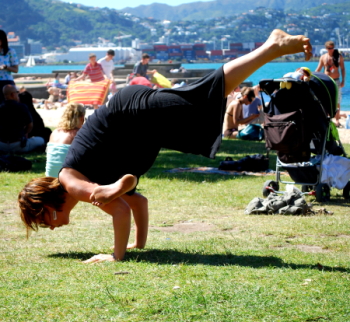Though we all know, as good yogis should, that the purpose of our practice is to create a greater sense of inner peace and self-actualization, it’s sometimes difficult to not push ourselves past our physical limits.
by guest author Seka Ojdrovic
It’s often said that we are our own worst critic. Part of being human is striving to attain the unattainable and not being satisfied until it’s within our grasp. The practice of yoga is no exception, as we often literally stretch ourselves to the limit in order to achieve what we think of as the “perfect” pose.
Perhaps at the beginning stages of our practice we are so awe-struck by the effect it has on our lives that we temporarily put the competitive instinct at bay. But as the practice evolves, we’re given a taste of some of the more challenging asana we’re potentially capable of, and if we’re not careful we approach the practice with ruthless determination instead of quiet contemplation.
Particularly for those with a goal-oriented personality, the temptation of achieving an out-of-this-world peak pose can overpower any other benefit coming from the practice of yoga. Even more frustrating is when all of the pressure we put on ourselves actually begins to work against our practice so that we aren’t as holistically focused.
With this in mind, it’s possible to continue challenging yourself while remaining mindful and respectful of the essence of yoga.
1. Don’t forget to breathe!
It may seem a simple reminder, almost patronizing to the seasoned yogi, but when strain replaces ease in maintaining some of the tougher poses we often forget about our breath. I myself have battled my way into galavasana only to realise I had been holding my breath the entire time. Needless-to-say, once I started breathing again I quickly fell back out of the pose. To maintain the integrity of the practice we must always respect our breath.
2. Create a specific series with your “goal” pose in mind without getting into the actual pose.
Say the pose you’ve been struggling with is lolasana (pendant pose). Rather than getting down on yourself as you fall short of the full posture, focus on creating a sequence that will hone the necessary muscles for it. Since this is a pose that requires a great deal of core strength, you could incorporate boat pose, plank pose, and nauli breathing. That way you will be ready for the time when the full pose is available to you.
3. Allow frustration to concede to humour.
The most important thing is that you’re getting something positive from your practice. The easiest way to break the tunnel-vision that comes by competing with ourselves is to have a nice, long giggle. It may help with your yogic breathing, too!
4. Focus for a while on a pose you truly enjoy.
It’s easy to beat the proverbial dead horse if you obsessively focus on the same pose time and time again. Take the time to remind yourself why you love yoga so much in the first place. We all have those lovely, comforting poses that make us feel relaxed and joyful; now is the perfect time to revisit that old friend.
5. Remind yourself that you have a lifetime to get it right.
Beginning yogis often mistakenly think that their favourite gurus reached their advanced levels of asana by constantly testing their physical limits. The truth is, as we progress we begin to identify where yoga goes so far beyond just asana. Holding advanced poses is merely a by-product of the overall gain that comes with a faithful yoga practice. Keep your ego in check by remembering that these poses will come in time, but the time may not be right now.
What really helps us thrive as yogis is developing a fulfilling home yoga practice to meet all of your personal needs. Only you know which area of your body needs the most attention – tight hips, limited movement in the shoulders, weak core – and by using the above tips you’re bound to create your perfect yoga practice.
Another thing to realise is that if we learn to be kinder to ourselves, in our yoga practice and every other aspect of our lives, we are learning to be kinder to others. Change starts at home and what is more personal than your own temple (your body)?
With these thoughts in mind, roll out your yoga mat and take a moment to be thankful for where your practice is right now. You’re exactly where you should be, and it is easy to find the peace in that.


amen to that! exactly what i needed to read today 🙂
Awesome! Me too.
Big thanks to Seka, guest author 🙂
KL
Ah! So true, and I especially like #5. The strength you see in yogis really is built up over years – the longer I practise for, the more fully I realise this. Things that once felt like a struggle just happen, and the less I judge myself, the easier it happens! Makes life such a fun adventure…x
Hey Trudi,
Bring on the fun I say! It is so easy to forget about joy during a practice… yet just being able to move is such a pleasure.
Thanks for the great comments! It’s nice to know that we’re all in this together when it comes to the struggles and accomplishments in our practice of yoga.